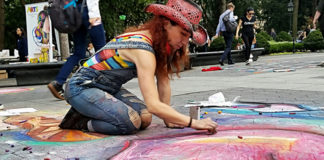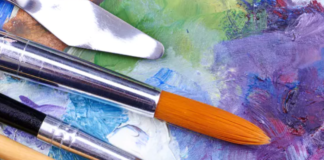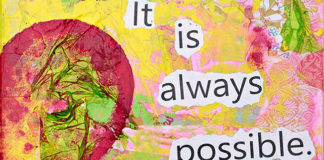Tag: art and well being
Disability as a Creative Practice
I wanted to explore how time and sequence work when memory is disrupted, in my case due to traumatic brain injury. I needed to document and reclaim my own sensorium.
Creativity and COVID: Art-Making During the Pandemic
The pandemic lockdown last year afforded me a precious gift of time to explore my creative spirit, and that, in turn, gave me a powerful way to cope.
The Light in the Dark
Darkness began to consume my life, both literally and metaphorically. My surroundings and even my own thoughts would become distorted into something terrifying. As the nights droned on, shadows in my dorm room would contort themselves into threatening figures. The whispers continued to grow, overcoming the thoughts in my head.
Why I Take Drugs and Don’t Plan to Stop
If the drugs I am prescribed did not benefit me overall, believe me, I would no more take them willingly than I would swallow rat poison. I went through many attempts to wean myself, but invariably the loss of my ability to do art brought me to the place where I went back on them. I remain on them and I want to remain on them.
The Bipolar Artist: A Lifelong Sentence to Bear
I was told that I had only two choices: Do not have children, or take lithium while I was pregnant—the drug that posed the least amount of birth defects, and the very medication that had killed the painter in me years ago. I refused both options and set out on my own, and luckily found a willing psychiatrist to help me taper off the meds.
Teen Mental Health Crisis Magnified by Demise of Creative Subjects
From The Conversation: "To thrive emotionally, young people need their own time and space, that is not explicitly directed at particular outcomes. This should...
David Foster Wallace: Suicide and the Death of Agency
Today is the 10th anniversary of David Foster Wallace’s suicide. While it’s not fair to build an entire theory on an incredibly complicated issue like suicide around one person, Wallace’s death should challenge the common narratives around suicide — that “mental illness” causes it and that “we can’t ever know why people do it.” Both of these are self-serving platitudes that are simply not true.
Envisioning Psychiatric Drug Freedom
Psychiatric meds can shut down the emotions and consciousness enough to make it possible to tolerate dynamics that would inspire rage or surges of empowered activity without the meds. It can be helpful to look closely at these blocks and start to create a map to freedom, understanding that it is a complex process that involves not only the physiology of the body of the individual taking meds, but the architecture of the social system around that person.
Research Shows Art Courses Can Improve Mental Wellbeing
From PsyPost: A new study has found that a course of arts-on-prescription can provide a significant improvement in mental wellbeing, including in those with very...
Twenty Years of Art at Bethlem Hospital
From BBC: At Bethlem Royal Hospital, a psychiatric hospital in London, patients are given the opportunity to work in the hospital's art studios as part...
Healing from Psychiatry: A Community Art Book
I began reaching out to other psychiatric survivors, asking whether they would like to have their art featured in a book, and the response I received was amazing. People openly shared not only their art but their personal stories, their feelings, and their painful journeys into, through, and out of psychiatry.
How an Ancient Singing Tradition Helps People Cope With Trauma
From YES! Magazine: Lament singing, an ancient tradition once observed for spiritual purposes during funerals, weddings, and times of war, is now seeing a revival in...
Mental Well-Being and Engagement in the Arts
Public health researchers at the University of Western Australia examined the relationship between recreational arts engagement and mental well-being in the general population. The results, which have implications for policy makers as well as health practitioners, indicate that those who engage with the arts for two or more hours per week have significantly better mental well-being.





















